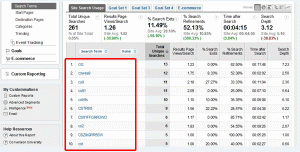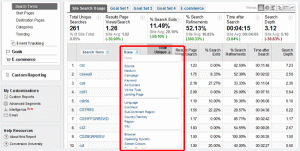Published: May 28th, 2010
If you have internal site search capability on your website you can track and display important data about your visitors and most importantly what they are looking for. You should use this performance data to choose keywords and destination URL’s for your Adwords campaigns to maximise ROI and effectively increase keyword conversion rates.

Expand Adwords Keywords
The Search Terms report shows all the keywords that visitors entered into your internal search box. This is a great way to identify missing keyword opportunities and to expand your existing search query lists. Look at the most popular searches, highest conversion rates and see which keywords are converting (ecommerce) after searching and consider adding them to your adwords campaigns.

Use Top Landing Pages
The Search Terms report also allows you to look at a popular search term and see which landing page is most often selected. This shows where users go when they are searching for something in particular. Make this page the landing page for this keyword and make sure that your valuable content is more easily accessible. This way you can successfully decrease your sites bounce rate, attract higher quality leads and maximise return on investment.
Published: May 26th, 2010
Blueclaw Media Ltd is a well established, fast-growing SEO and internet marketing agency based in Leeds, UK. We feature on the 1st page in Google.co.uk for keywords such as ’seo company’ and ’seo services’. We are also winners of the DADI Award for the SEO and PPC categories.
Blueclaw is a creative space with a dedicated SEO team working to deliver exceptional results for our clients.
Our diverse client base ranges from large internationally recognised brands to smaller local businesses, across a range of industries including retail, insurance and home services markets in both the business to business and business to consumer arenas.
SEO Manager
The purpose of this role is to drive SEO activity across the Blueclaw client portfolio. The SEO manager will ensure that the latest SEO techniques and technologies are being applied to all campaigns to ensure Blueclaw exceeds client expectations.
Published: May 26th, 2010
- Filter out and pause all search terms that have generated high number of impressions and low ctr’s.
- Eliminate keywords that did not lead to a click.
- Change keyword matching options.
- Stop all non-converting keywords.
- Increase cpc bids on search terms that show positive ROI.
- Expand the list of terms with positive ROI and apply across your ad groups.
- Decrease cpc bids on keywords with low conversion rates.
- Tailor your ad copies to products or services you promote (keyword insertion, descriptive display URL’s).
- Test multiple marketing messages and call to action phrases.
- Apply more negative keywords at the campaign and ad group level.
Published: May 19th, 2010
If you have a high traffic ecommerce site, you may have noticed that some of your visitors are big spenders. These visitors generate high value transactions and consistently buy your most expensive products so why not attract more of those big buyers to your site? Improve your ROI by buying more of the keywords that they search on!
The best way to find out which keywords refer to your most valuable customers is to set up a ‘Custom Segment’ in Google Analytics. The majority of advertisers normally use the ‘ga keyword report’ in order to see which keywords bring in the most value but if you create a custom segment, you can access more advanced keyword ROI data and purely focus on top converting customers.
Published: May 17th, 2010
A good guide to getting your content on Google News by Rob Kerry (@robkerry). It’s a great way to make the first page of Google for a very competitive keyword, even if it is only in the short term. In the long term, you benefit from indexed content and hopefully ranking for long tail keywords. Rob also suggests that instead of panicking about Personalised Search and how that is going to affect SEO, think instead that if you get a high CTR from your Google News item that your webpage will be counted favourably towards each visitor’s “personalised” search result. Also try to take advantage of your visitors through strong Conversion Optimisation.
1 - You need a unique URL. Wordpress is recommended as it takes all the legwork out of making sure each and every URL is unique.
2 - There has to be at least 3 numbers in your unique URL. These can no way resemble a date.
3 - Suggested permalink structure: /%postname%-001%post_id%.html


